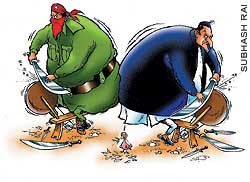 SUGA (Mahottari District)-Officially, the district headquarters of Mahottari is a town, but it retains all the characteristics of a village, including a hyperactive bush telegraph.
SUGA (Mahottari District)-Officially, the district headquarters of Mahottari is a town, but it retains all the characteristics of a village, including a hyperactive bush telegraph. Nothing can happen in Jaleshwar without everybody in the outskirts coming to know of it the very next morning. In the middle of Dasain holidays, the officiating Indian envoy in Kathmandu was here, and the village was already buzzing with the news. People speculated about the intended purpose of his visit.

The only appointment the senior diplomat seem to have had was to hand over some books to a private school. According to local papers, Mr Ashok Kumar said that his three-day visit to Janakpur and Jaleshwar was purely personal. There is no reason to doubt this, since a pilgrimage to Sita's birthplace is a part of every devout Hindu's itinerary.
Indian diplomats, in particular, have always delighted in the warm hospitality of a town that considers itself the cultural capital of Mithila, a transborder culture that has linguistic links in both Nepal and Bihar. People of this region have to rely on each other's physical infrastructure so much that roads on both sides of the international border repeatedly cropped up during informal talks that the diplomat had with the Janakapur intelligentsia.
The transport problem has become even more acute these days as the roads in Bihar are in ruins, while much of Mahottari and Dhanusha on our side have no roads at all. Even after fifty years of planned development, residents of western Mahottari have to travel through India to reach their own district headquarters. Most of the vehicles plying on the dilapidated Bhittamod-Sursand Road in Bihar display distinctive red Nepali plates with Devnagari numerals.
Meanwhile, if the Parikrama Sadak and Hulaki Road were built, the trend would perhaps reverse. No one in their right mind would like to travel on Bihari roads if they can help it. The local unit of the Sadbhavana Party in Janakapur told the visiting diplomat that the condition of Indian roads are of as much economic interest to Biharis as they are to Nepalis.
However, whether New Delhi bureaucrats care any more about the welfare of Biharis is an altogether different story. Anaemia at the periphery while the centre suffers from high blood pressure is the development reality in both India and Nepal.
Still, I had a nagging suspicion: did the Indian envoy's holiday here have anything to do with the time that Atal Behari Vajpayee took in sending his congratulatory messages to the king's appointee, Lokendra Bahadur Chand? For those who know South Asia's bureaucratic procrastinators, the delay could have been perfectly routine. After all, it took our own Shital Niwas nearly two weeks to draft a condolence message to Megawati Sukarnoputri for the Bali blast.
It's difficult to believe, though, that a late dispatch from Lainchaur was the sole reason for the delay in getting a diplomatic message that is considered an official high-five from big brother. The silence from New Delhi had become particularly glaring because of the speed with which the Chinese congratulated Minister-in-Chief Chand.
The cynical speculation this triggered in our conspiracy-ridden circles was that New Delhi had been holding out for some concessions before sending what should have been a routine message. But the doctrine of reciprocity in dealing with neighbouring countries-regardless of the history of proximity in all aspects of life-is too deeply ingrained in the minds of South Block diplomats.
Not that recognising Lokendra Bahadur by neighbouring governments matters all that much. His cabinet is composed of royal appointees, and it's merely an extension of the executive arm of the king without any locus standi under the 1990 constitution. Even though it wasn't said so in so many words, the king temporarily suspended the constitution for all practical purposes as soon as he assumed executive powers. Can an executive king also be a constitutional monarch? That question is now academic.
In the resulting constitutional void, foreign governments have no option other than dealing with appointees of the king, whoever they may be. It is this stark reality that must have emerged when the American and Chinese ambassadors had an audience with the king on 4 October.
In all probability, New Delhi too was directly briefed at the highest levels prior to the dismissal of Sher Bahadur Deuba. The reason king chose not see the officiating Indian envoy was perhaps because the designated ambassador hadn't yet arrived. King Gyanendra is said to be a stickler for protocol, and had there been an accredited Indian ambassador it's quite unlikely that the king wouldn't have seen him.
The rumour that Indians were peeved at being ignored and were merely showing their displeasure by withholding the routine diplomatic message doesn't look to be too convincing. Ashok Kumar wasn't in Janakpur to sulk.
So, why the delay? Was there some geopolitical give-and-take before the cautiously-worded message to Chand came? We will know sooner or later, just like we knew sooner or later about Kalapani, Mahakali, or the new draft friendship treaty.
Until then, it's a balmy autumn here in tarai, worthy of weekend breaks for more diplomats from Kathmandu. Ideal time to visit: Tihar (3-6 November) and the Mithila festival of Chhath (9-10 November) celebrated on both sides of the border.



